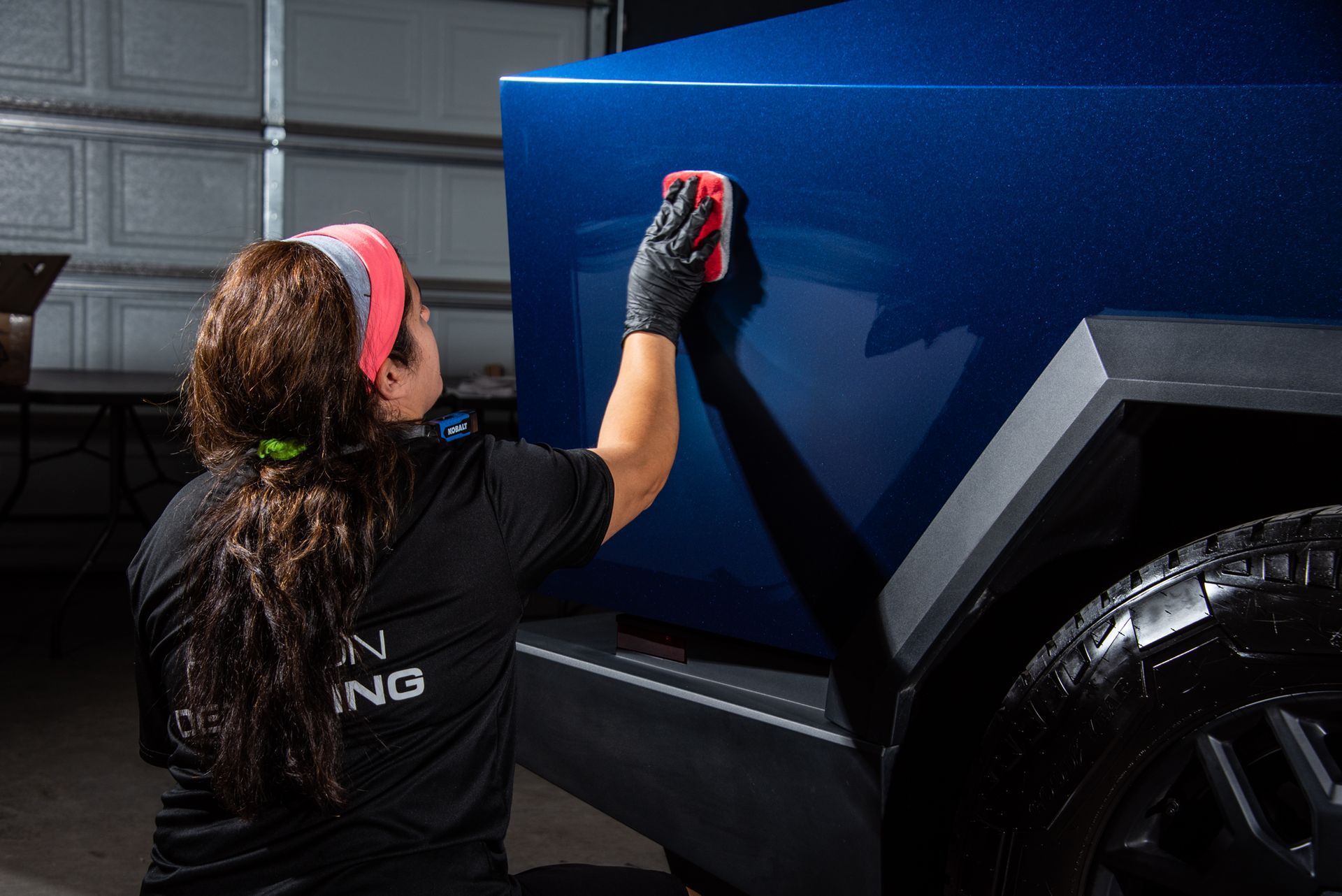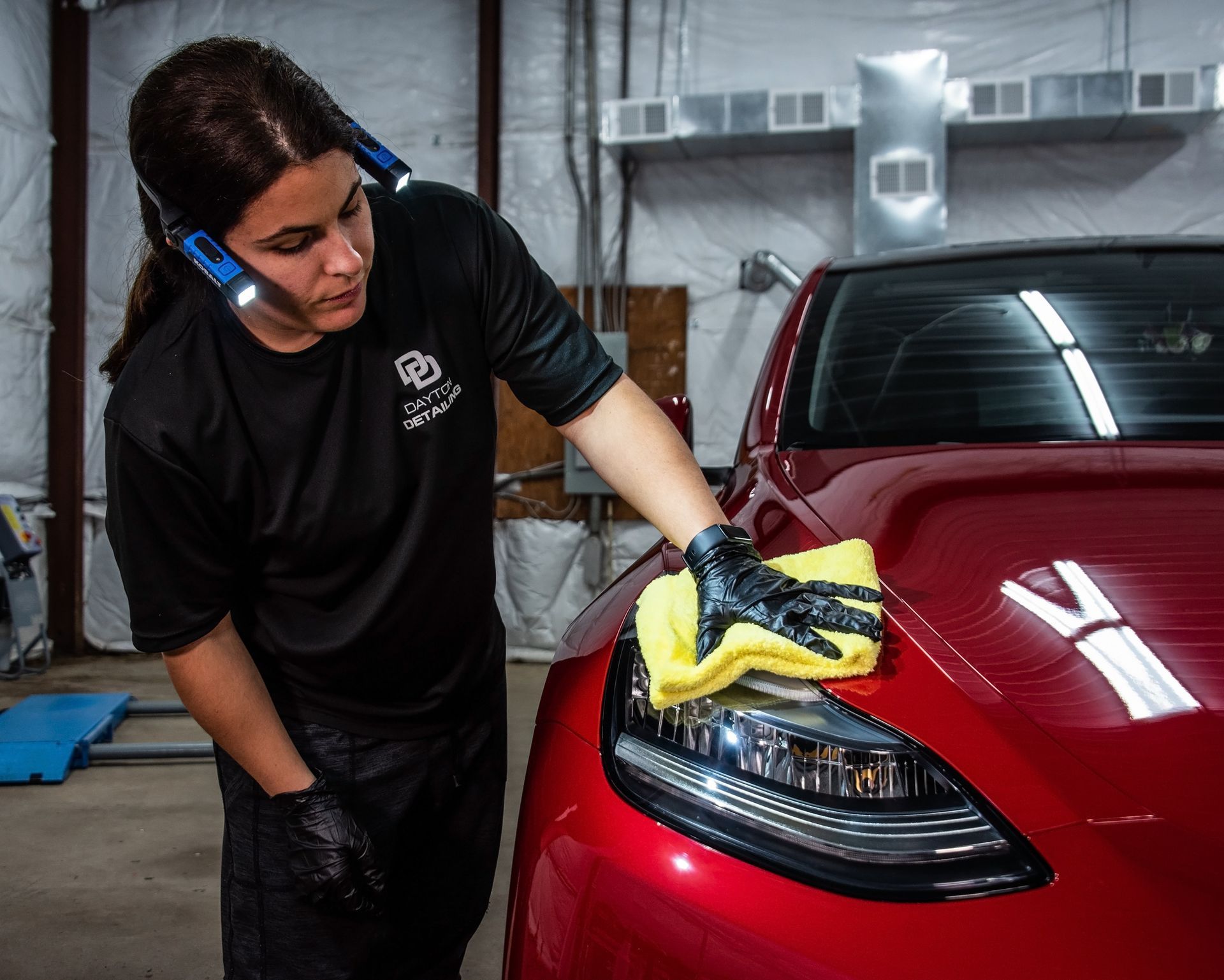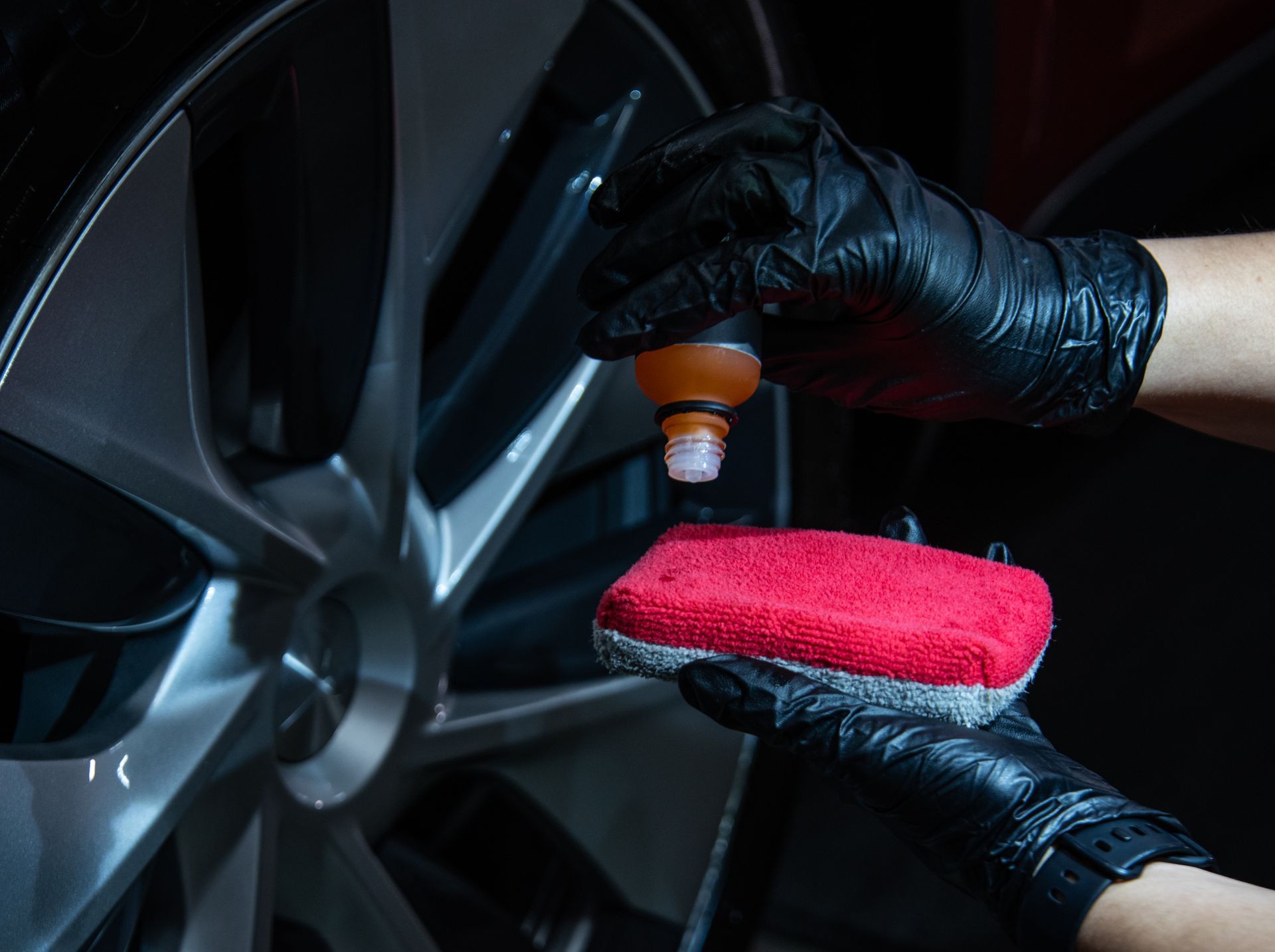Is Ceramic Coating Safe? Exploring Risks and Benefits for Your Vehicle
GET A FREE ESTIMATEPreserving a vehicle’s appearance while protecting it from environmental damage is a common concern for car owners. Ceramic coatings offer a modern solution, providing durable resistance to UV rays, contaminants, and grime—while enhancing gloss and reducing maintenance needs. Although ceramic coatings are highly effective, it is important to consider both their benefits and limitations before deciding whether this protective option aligns with your vehicle care goals.
Yes, ceramic coatings are considered safe for use on vehicles, providing protection against UV rays, chemical stains, and dirt while enhancing the car's appearance. However, it's essential to choose high-quality brands with certified formulations to minimize any potential risks and ensure long-lasting performance.
What Is Ceramic Coating?
Ceramic coating is a liquid polymer that acts as a formidable layer of protection for your vehicle’s exterior. When applied carefully by hand, it chemically bonds with the factory paint, creating a durable and resilient finish. This isn't just any paint protection; it's akin to giving your car a sophisticated shield that helps preserve its beauty against the elements. One of the most impressive features of ceramic coatings is their longevity. Typically, these coatings can last anywhere from two to five years, provided they are properly maintained. This contrasts sharply with conventional waxes or sealants, which require frequent touch-ups every few months. Imagine the convenience of applying a protective layer once every few years instead of worrying about constant reapplications.
Moreover, ceramic coatings possess remarkable hydrophobic properties, meaning they repel water effectively. When rain falls on a coated surface, water beads up and rolls off, taking dirt and debris with it. This magical effect enhances cleanliness and makes regular maintenance simpler—less grime sticks to the surface, translating to less time spent washing your vehicle. The magic behind ceramic coatings lies in their chemical composition. Generally composed of silica dioxide (SiO2) and often blended with titanium dioxide (TiO2), these components work together to create an extremely tough surface on your car's finish. Due to this advanced formula, they offer fantastic resistance against UV rays and chemical stains.
As more consumers prioritize safer and more sustainable vehicle care solutions, ceramic coatings have gained significant popularity. Known for their durability and ease of cleaning, these coatings appeal to those seeking low-toxicity options across various industries. However, despite their growing use, some experts urge caution. Concerns remain about the potential for certain formulations to release harmful substances over time. For this reason, it's important for consumers to research thoroughly and select high-quality ceramic coatings backed by reputable certifications and safety standards. Ceramic coating represents an innovative leap forward in vehicle care, offering an appealing blend of aesthetics and longevity. Understanding its components and potential risks can empower you to make informed choices when considering this modern solution for protecting your vehicle.
Chemical Composition and Safety
Ceramic coatings predominantly consist of silicon dioxide (SiO2), sourced from natural elements like quartz or sand. This crucial component determines the durability of the coating and its overall effectiveness in protecting your vehicle. The higher the SiO₂ content, the tougher and more resilient the coating becomes against environmental factors like UV rays and dirt accumulation. Interestingly, some formulations also include titanium dioxide, which can enhance hardness but might introduce concerns regarding toxicity, primarily due to solvent usage necessary for maintaining a liquid state.
The concentration of SiO₂ found in various ceramic coatings can range significantly—anywhere from 50% to over 90%. This variance illustrates that not all coatings are created equal; a higher concentration of SiO₂ often translates to improved protective qualities yet may come with heightened scrutiny regarding harmful substances. While it’s reassuring that many ceramic coatings are marketed as being safe for general consumer use, the long-term safety data surrounding these products is still developing. As consumer awareness around safer and low-toxicity products increases, so does the interest in ceramic coatings as alternatives to traditional paint protection methods. It’s crucial for consumers to look for quality certifications when considering any ceramic coating. Finding reputable brands that prioritize safety in their manufacturing processes can make a significant difference. Engaging with user reviews and experiences can shed light on a specific product’s performance and safety features too.
UV Protection and Surface Preservation
One of the standout features of ceramic coatings is their remarkable ability to provide UV protection. When exposed to the sun, car paint can undergo significant degradation, leading to fading and oxidation. Vehicles can experience a reduction in UV damage. This is like giving your car a sunscreen that shields it from harmful rays, ultimately preserving that rich color you love. For car owners who expose their prized possessions to the elements—especially on sunny days or long road trips—ceramic coatings act as a formidable barrier, preventing unsightly environmental wear. The protective layer formed by ceramic coats isn’t just a thin film; it’s akin to adding armor over the paintwork, keeping it fresh and vibrant.
Ceramic coatings provide a hardened surface that resists contaminants, makes cleaning easier, and helps maintain a glossy, showroom-quality finish. Less buildup means fewer imperfections over time—and more time enjoying your ride without constantly worrying about cosmetic upkeep. Beyond these impressive benefits lies the compelling aspect of durability, further reinforcing the rationale behind choosing ceramic coatings for your vehicle protection.
Enhancing Vehicle Aesthetics
Ceramic coating goes beyond just protecting your car; it fundamentally enhances its visual appeal. Imagine a surface so sleek and glossy that it practically sparkles under the sun—this is what ceramic coatings deliver. The liquid polymer not only shields the paint but also creates a high-gloss finish that amplifies colors, giving your vehicle a vibrant and striking look.
Vehicles treated with ceramic coatings are reported to maintain that fresh-off-the-lot allure for years, setting them apart from their dull, waxed counterparts. There has been a remarkable increase in client satisfaction attributed to the aesthetic enhancements provided by ceramic coating. When clients witness firsthand the transformation—a vehicle that gleams with a depth of color previously unseen—they feel an undeniable sense of satisfaction. This elevated satisfaction transcends a simple cosmetic upgrade; it's part of a comprehensive experience that makes vehicle ownership more enjoyable.
Potential Hazards and Health Concerns
While ceramic coating offers impressive protective benefits for your vehicle, it isn't without its risks. Certain low-quality coatings may contain potentially harmful chemicals, such as fluorine or various volatile organic compounds (VOCs), which can be toxic when inhaled. These substances can lead to serious health issues. This concern is particularly pronounced among DIY enthusiasts. Reports have emerged about users experiencing respiratory problems after applying these coatings without proper ventilation. Imagine trying to apply a product designed to protect your car while inadvertently compromising your health—it's a sobering thought. Taking precautions such as wearing a mask, using gloves, and ensuring you work in a well-ventilated area is crucial when dealing with any chemical product.
If you're unsure about the safety of a product, it's always wise to choose those that have undergone rigorous safety testing or opt for professional application services like those offered by Dayton Detailing. It’s important to remember that doing things right also extends to understanding the limits of these products. Aside from potential health risks, the environmental impact of ceramic coatings warrants attention. Improper disposal of leftover product can harm local ecosystems. Manufacturers should ideally provide guidance on how to properly recycle or dispose of their products once they’ve served their purpose. Furthermore, regular maintenance of the coating itself—as simple as washing your vehicle—can mitigate some risks associated with the buildup of debris and contaminants that can degrade the performance of the coating over time.
Therefore, adopting a maintenance schedule is not just about keeping your vehicle looking great; it’s also about ensuring you minimize hazards associated with the coating. Routine washes every few months using compatible cleaning products help keep your ceramic intact while allowing it to perform its job effectively. Awareness regarding potential hazards is essential for safe application and continued effectiveness. Understanding these factors plays a crucial role in protecting your investment.
Comparing Alternatives to Ceramic Coating
If you decide against ceramic coating, you still have solid options available. One popular alternative is waxing, which has been a go-to for decades. Wax typically provides a visual shine and some level of protection against UV rays, but its durability is significantly shorter than that of ceramic coatings, lasting around 1-3 months at best. However, it’s important to note that wax should be reapplied frequently, leading to higher long-term maintenance commitments.
People often assume that once you apply wax, your car will remain protected for months. In reality, it's more like monitoring your status updates; you'll need frequent checks to ensure your layer of protection isn't thinning away. Switching from wax to paint sealants alters the situation slightly. Paint sealants offer better longevity — typically up to six months — but still don’t match the durability of ceramic coatings. They create a synthetic layer over your paintwork that enhances gloss and offers decent protection against contaminants. Many enthusiasts enjoy the ease of use when applying sealants compared to wax, making it a strong contender for those who want a bit more than wax without jumping into ceramic coatings.
On the horizon lies paint protection Film (PPF), a robust option for vehicle owners focused on shielding their investments. PPF boasts impressive longevity with a lifespan of 5-10 years, putting it in direct competition with ceramic coatings. Its thickness enables excellent scratch resistance and protects against stone chips, which can be a concern, especially for those who frequent gravel roads or urban environments where debris can be kicked up easily. What makes PPF particularly appealing is its ability to heal itself; light scratches can disappear if left alone in sunlight for a while.
However, with superior durability comes a steeper price tag. PPF tends to be one of the most expensive options on the market due to its extensive protective qualities and professional installation requirements. Considering the extent of damage that unprotected paint can sustain, many people believe that investing in PPF offers a significant sense of peace. When deciding between these alternatives, consider your priorities: Are you seeking maximum shine with minimal commitment? Wax might be your answer. Do you value longevity with balanced protection? Paint sealants deliver well in this regard. Or are you determined to spare no expense to defend your vehicle's exterior? Choosing PPF could be a wise decision.
Navigating these various options offers insights into the protective solutions available for your vehicle's exterior. Grasping the nuances of each choice is essential as you weigh their respective benefits against your personal preferences.
Evaluating the Worth of Ceramic Coating
To truly grasp the value of ceramic coating for your vehicle, one must weigh the initial expenditure against the prolonged benefits it delivers. Many car owners find themselves surprised by the upfront costs, which can fluctuate between $500 and $2000 depending on the vehicle's size and condition. However, this seemingly steep price tag unlocks impressive benefits that gradually become apparent. Once your vehicle is treated with ceramic coating, you’ll notice a dramatic decrease in the frequency of detailing services required. Imagine spending less time at the detailer’s and more time enjoying that glossy finish!
Additionally, ceramic coatings play a crucial role in protecting vehicles from various environmental elements. With high-performance ceramic coatings (HPCC), vehicles benefit from resistance to corrosion, UV damage, and chemical attacks—all critical factors for maintaining beauty and structural integrity. The reality is that maintaining a vehicle often involves ongoing costs, such as washes, waxes, and corrections due to weathering and environmental exposure. While some might argue that traditional waxing methods are sufficient for protecting paintwork, they demand routine upkeep every few months. Alternatively, ceramic coating can extend this period significantly while enhancing paint gloss and creating hydrophobic surfaces that repel dirt and grime.
This means fewer washes are needed and less likelihood of deep-set stains or erosion over the years—an invaluable relief for any car owner striving to keep their vehicle pristine without excessive effort. If you've ever washed your car only to find it dirty again the next day, you'll appreciate ceramic coating's ability to repel dirt and debris, preventing your car's shine from disappearing! Ultimately, investing in ceramic coating does more than just offer peace of mind; it proves financially savvy in the long run by extending the life of your vehicle's exterior while servicing it fewer times.
Top Ceramic Coating Services in Dayton, OH
At Dayton Detailing, we offer
industry-leading ceramic coating services that combine protection and performance to keep your vehicle shining through every season. Our advanced coatings form a durable, hydrophobic layer that shields your car from UV rays, environmental contaminants, and daily grime—while enhancing its natural gloss. Whether you’re preparing a new car for the road or preserving a longtime favorite, our expert application ensures lasting results and reduced maintenance. Discover how ceramic coating can bring lasting value to your ride—schedule your appointment with Dayton Detailing today!






